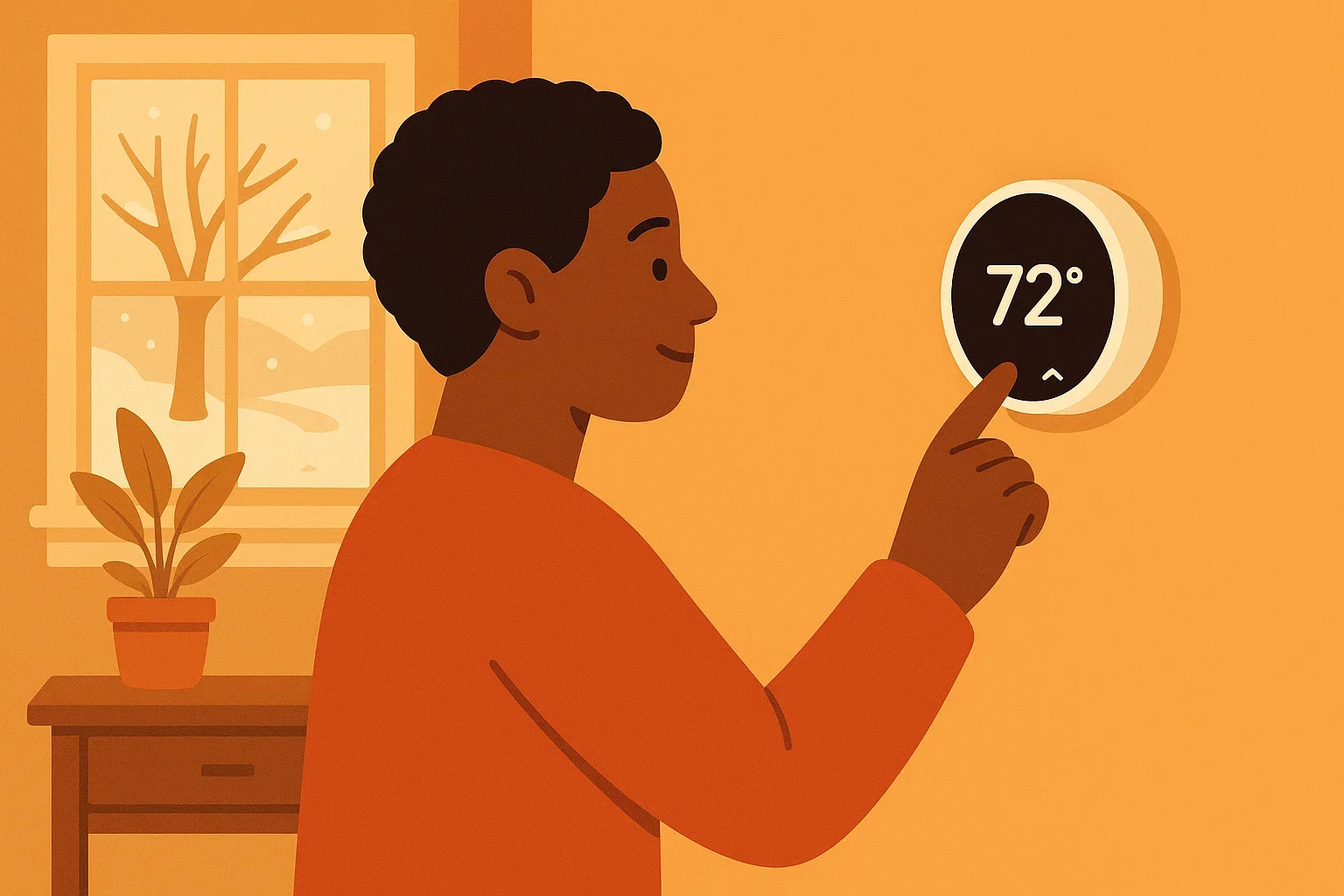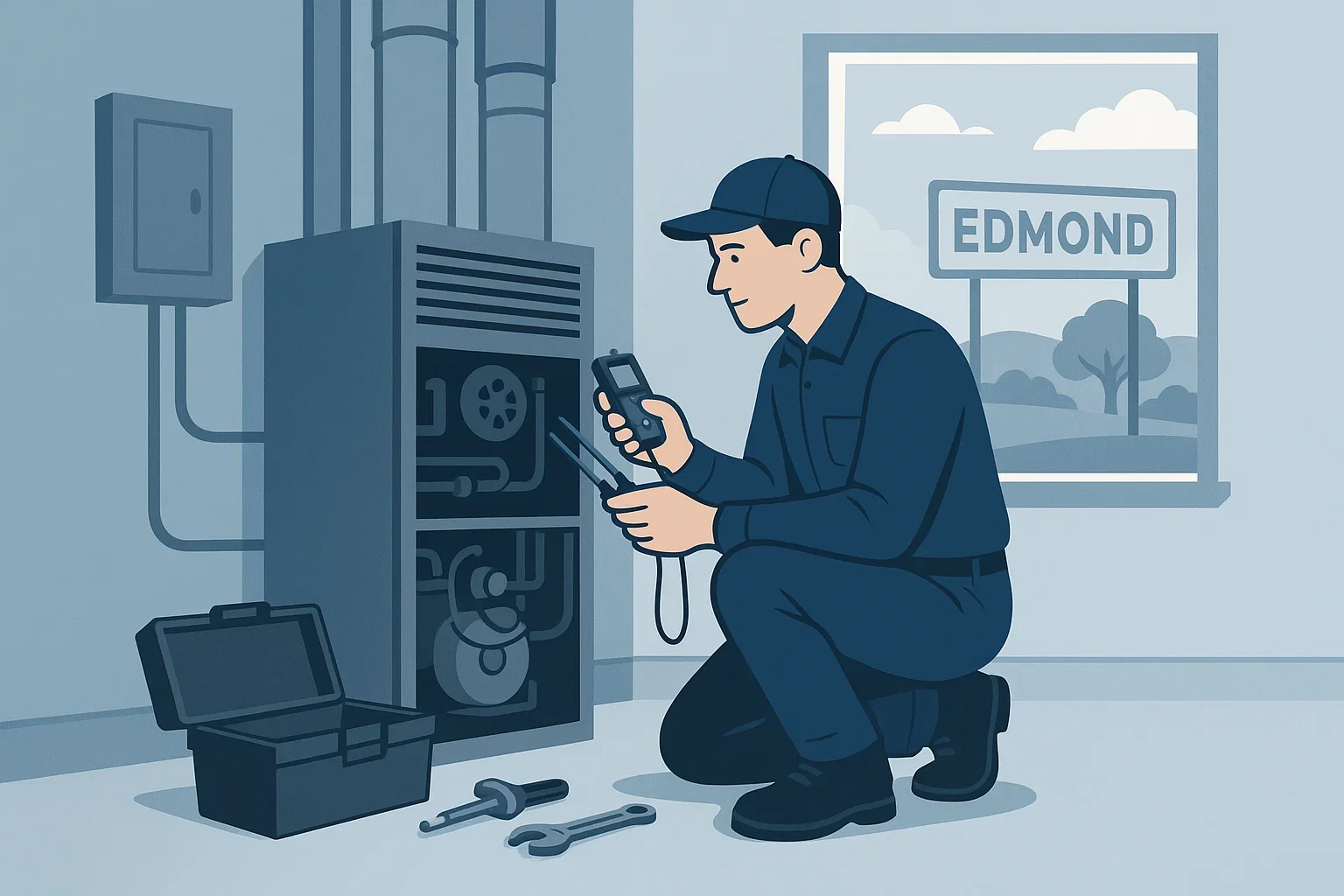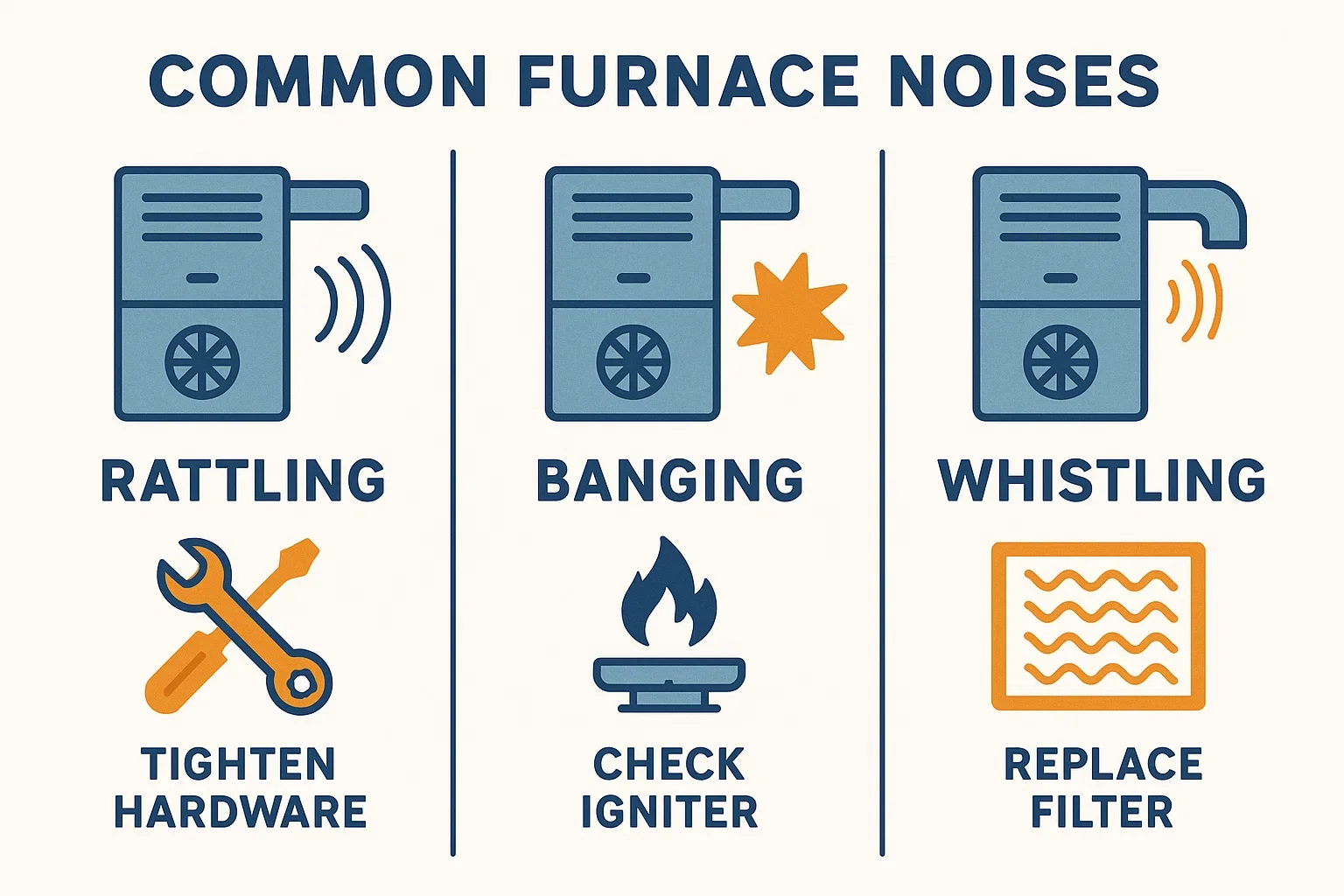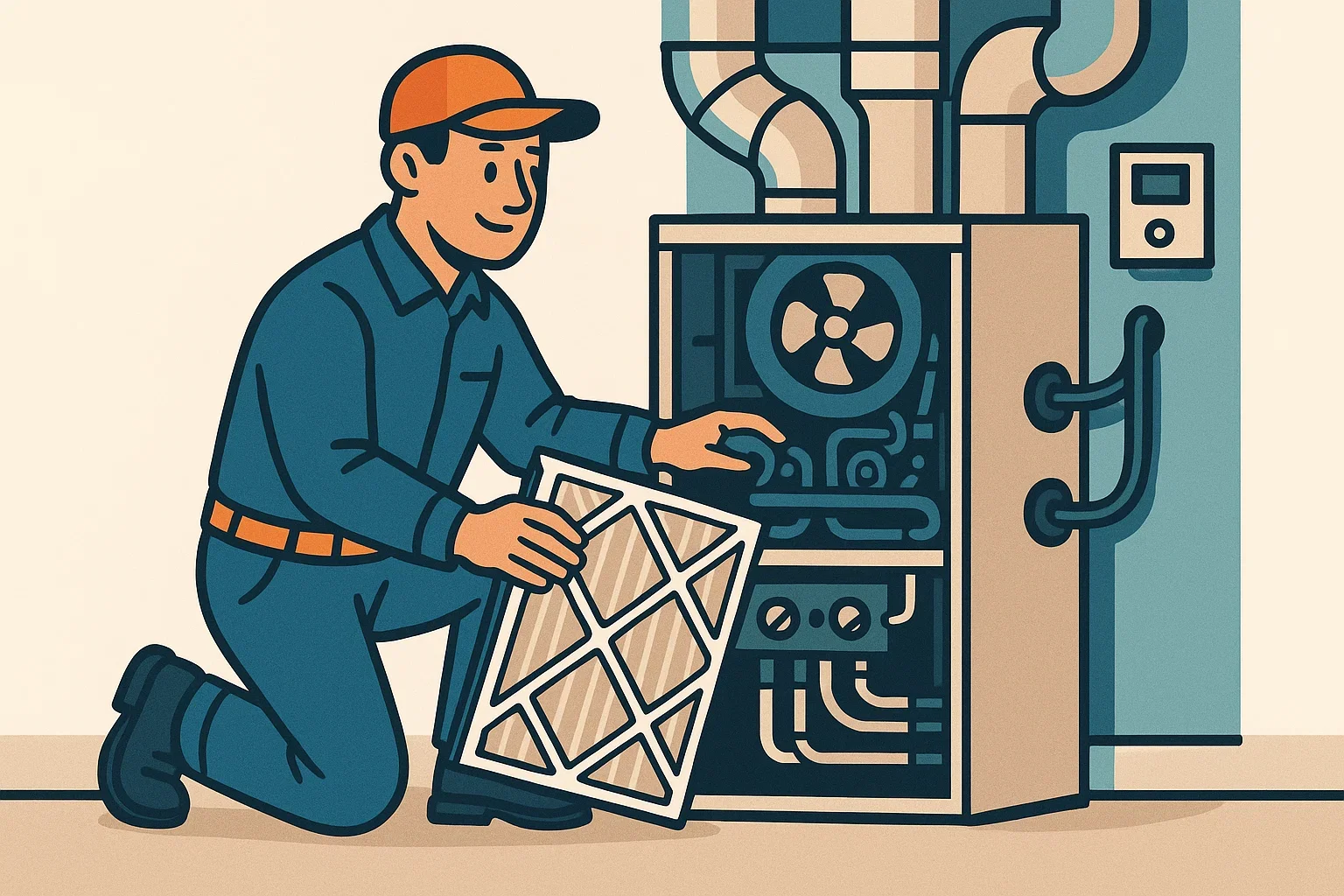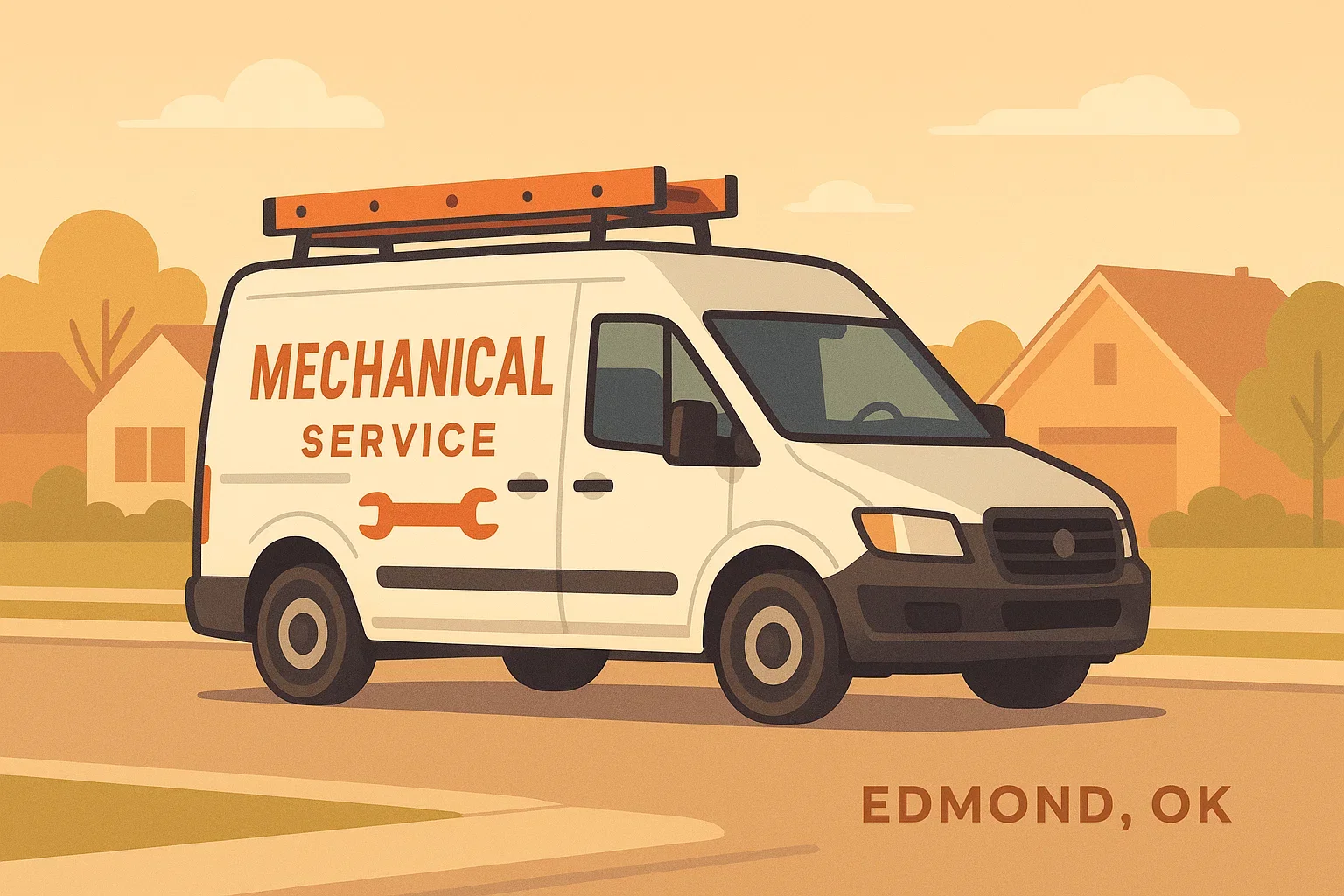Why Is My Furnace Making Strange Noises? Edmond Winter Heating FAQ
As temperatures drop in Edmond, many homeowners hear their furnace make new and unexpected sounds. A sudden bang, rattle, or whistle can feel alarming—especially when you’re counting on your heater to keep your family warm. But not every sound means disaster. Some are normal, while others are early warnings that your heating system needs a tune-up.
In this guide, we’ll explain the most common furnace noises, why they happen, and what you can do to stop them. You’ll also learn when to call a local Edmond HVAC professional before small issues turn into costly repairs.
Understanding Why Furnace Noises Happen
Every furnace has moving parts, electrical components, and metal ducts that expand and contract with temperature changes. But when your heating system starts producing loud or unusual sounds, it’s often a sign of mechanical wear, debris buildup, or restricted airflow.
According to the U.S. Department of Energy, heating and cooling together often represent nearly half of residential energy consumption, and heating alone can make up a large portion of winter utility costs. For Edmond residents, that’s especially important during unpredictable Oklahoma winters, when furnaces run longer hours and small problems become noticeable.
Common culprits include:
Dust or debris around burners or blower fans
Loose screws or panels vibrating against the unit’s casing
Worn motor bearings or belts
Duct expansion noises due to temperature swings
Ignoring these sounds can reduce efficiency, increase your utility bills, and in rare cases, lead to safety issues if gas combustion is affected.
What the Most Common Furnace Noises Mean
Every noise tells a story about what’s happening inside your heating system. Here’s what each sound could be saying:
1. Loud Bang or Boom on Startup
A loud boom right when the furnace ignites is one of the most common—and potentially serious—complaints. It’s usually caused by delayed ignition, where unburned gas accumulates before finally lighting. This small explosion stresses your heat exchanger and can, over time, cause damage. Shut off your furnace and call a licensed HVAC technician immediately.
2. Rattling or Clanking
Rattling typically points to loose screws, unsecured ducts, or a blower wheel out of balance. Sometimes it’s as simple as tightening the access panels. If you still hear the rattle, it may mean the motor mount or inducer fan needs professional adjustment.
3. High-Pitched Squealing or Screeching
This sharp sound usually comes from a worn blower belt or dry motor bearings. Older furnaces rely on belts that can fray or slip; modern systems have direct-drive motors that need lubrication over time. A squealing furnace is a strong cue to schedule preventive maintenance.
4. Buzzing or Humming
A low hum is normal, but a loud or persistent buzz can signal electrical issues like a failing capacitor or loose wiring. If the sound grows louder or the lights flicker, turn off power and contact a professional to prevent motor damage.
5. Whistling or Whooshing
Whistling indicates restricted airflow—often from a dirty filter, blocked vent, or leaky ductwork. Replace filters every 1–3 months, and make sure vents aren’t covered by furniture.
6. Scraping or Grinding
Metal-on-metal scraping suggests the blower wheel is rubbing against its housing or that a small object has fallen inside. Shut down the furnace immediately to prevent further damage.
7. Clicking or Popping
A few clicks at startup can be normal ignition behavior. But continuous clicking or loud pops could mean faulty ignition components or ductwork expansion issues. In older furnaces, repeated expansion and contraction can create stress in the metal that sometimes leads to fatigue or cracks. While not common, these issues need professional inspection.
What You Can Do Before Calling a Pro
You don’t need to be an HVAC expert to perform safe, simple checks that might quiet your system:
Replace the air filter. Dirty filters are responsible for a large portion of airflow-related noises.
Tighten accessible screws. Vibrations can loosen panels and create rattles.
Clear nearby objects. Anything touching ductwork or the furnace cabinet can amplify sound.
Listen carefully. Note when the sound occurs—startup, running, or shutdown—and share that info with your technician.
Don’t ignore burning smells or gas odors. Shut off the furnace immediately and call emergency service if you suspect a leak.
Pro tip: Schedule your annual fall furnace tune-up before temperatures drop. Regular service helps you catch problems early, ensuring your home stays comfortable and energy-efficient all winter long.
Why Furnace Maintenance Matters for Edmond Homeowners
Oklahoma’s fluctuating winter temperatures put unique stress on heating systems. When the weather swings from 70°F days to freezing nights, ducts expand and contract rapidly—causing many of the “popping” or “booming” sounds homeowners notice.
A local HVAC contractor familiar with Edmond’s climate can inspect for:
Loose ductwork or weak insulation
Aging ignition systems that delay firing
Motor wear from constant temperature cycling
Routine maintenance doesn’t just prevent noise—it can potentially lower energy bills by up to around 15%, extend your system’s lifespan, and protect your indoor air quality. Actual savings vary based on system age and condition.
Key Takeaways
Strange furnace noises often indicate wear, loose parts, or restricted airflow.
Loud bangs or scrapes require immediate professional inspection.
Regular maintenance prevents ignition buildup and mechanical failure.
Replace filters and tighten panels before winter to prevent common noises.
Edmond homeowners should schedule fall tune-ups due to rapid temperature swings.
Conclusion
Strange sounds from your furnace don’t have to spell trouble—but they shouldn’t be ignored either. Whether it’s a faint hum or a loud bang, each noise is a clue about your system’s condition. Acting early helps protect your comfort, safety, and budget through the cold months.
If you’re hearing unusual sounds this winter, schedule a furnace inspection in Edmond with A&T Mechanical. Our local team specializes in heating maintenance, safety checks, and long-term comfort solutions for Oklahoma homes.
External Links:
Written by A&T Mechanical | Edited by Loving Life Media | Updated October 2025

